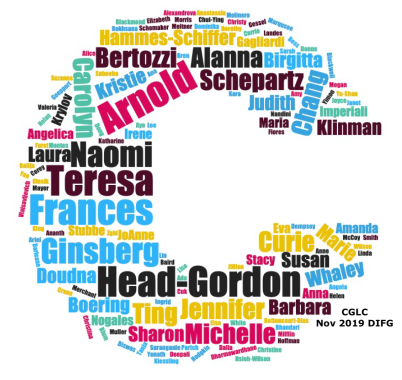One of the initiatives that stemmed from the results of our academic climate survey is the Diversity and Inclusion Focus Group (DIFG) series. These College of Chemistry-wide focus groups aim to provide a structured, recurring, neutral space for members of the CoC community to:
- regularly explore and engage in challenging conversations about a variety of topics that have been identified as areas of concern within our community;
- become exposed to alternative viewpoints and experiences;
- learn from one another; and
- help begin shifting our community social norms together, to create lasting and effective change within our academic culture and climate
Additionally, DIFG meetings are grounded in scientific literature, to initiate conversation and reduce any stigmas associated with talking about challenging topics.
We are always looking for volunteers! If you are interested in being a part of the DIFG Planning Committee that meets once a month, please contact ucbglc@gmail.com.
The 2020-21 DIFG series will be held via Zoom. The themes for each DIFG are below, and will be updated as the information becomes available. If you would like to be included on future emails, please reach out to ucbglc@gmail.com.
- October 2020: Transgender Issues in Academia
- How to use pronouns and respect trans and non-binary people
- How to foster inclusivity to all genders in your research group and academic department
- September 2020: Communicating with Your Advisor
- How to have difficult conversations with your advisor
- What kinds of questions should you be contemplating when joining a lab
- How to manage your advisor’s expectations
- August 2020: Mental Health
- The stigma in academia against going to therapy
- Learn more about graduate student mental health and student empowerment
- July 2020: Restorative Justice in the Chemistry Community
- How restorative justice can be one approach to our interactions with others
- Applying a restorative justice approach to situations based on real-life experiences
- June 2020: LGBTQ+ Inclusivity and Allyship
- The Stonewall Uprising and the history of driving change through riots and protest. Read about a brief history here.
- Past work done at Berkeley and other institutions to move beyond performative allyship.
- To learn more about the workplace for LGBTQ+ scientists in the physical sciences, here’s a report.
Below are the themes for the 2019-2020 DIFG series, as well as the resources they were grounded in:
- September 2019: Bias in peer review and letters of recommendation. Check out our slides here!
- October 2019: Issues that affect the “leaky pipeline” through STEM, and how we can make undergraduate research more inclusive. Articles: Along the Leaky Pipeline & Making a Difference in Science Education: The Impact of Undergraduate Research Programs. Check out our slides here!
- November 2019: After a remarkable first year of DIFG events that spanned a wide range of topics, we hosted a trivia to ask questions about the facts we learned! The categories/questions reflected conversations we had as a group, and one aspect of this event involved contributing names of female chemistry faculty members. The results were compiled into the following word cloud, with the intention of highlighting some of the amazing women in chemistry across the world.

- February 2020: Imposter phenomenon in academia—how can interpersonal communication and language help or hurt our sense of belonging in the scientific community?
- March 11, 2020: Mentoring and Communication Styles
- April 8, 2020: Xenophobia Related to COVID-19
- May 28, 2020: Communicating science, whether among peers or advocating for climate change and public health [a guide to paper-writing and talks with other scientists by Nature]
Below are the themes for the 2018-2019 DIFG series, as well as the resources they were grounded in:
- September 2018: Sexism in science [Serio, T. Speak up about subtle sexism in science. Nature, 2016, 532, 415]
- October 2018: Overcoming barriers to LGBTQ+ community inclusion [Barres, B. et. al. Coming out: the experience of LGBT+ people in STEM. Genome Biology, 2017, 18, 62.]
- November 2018: Microagression workshop on reducing unconscious bias (co-facilitated by the Unconscious Bias Project) [Grossman, J. M., & Porche, M. V. Perceived Gender and Racial/Ethnic Barriers to STEM Success. Urban Education, 2014, 49(6), 698–727.]
- February 2019: Peer-run sexual assault and sexual harassment prevention workshop (co-facilitated by Respect is Part of Research)
- April 2019: Mental health and managing work-life balance [Cooke, R. ‘Sleep should be prescribed’: what those late nights out could be costing you. The Guardian. 2017.; Norris, D. et. al. Health tips for research groups. Nature, 2018, 557, 302-304.]
Thank you to the PATH to Care Center for support and funding throughout the 2018-2019 DIFG series!
Please feel free to contact us at ucbglc@gmail.com to find out more!
